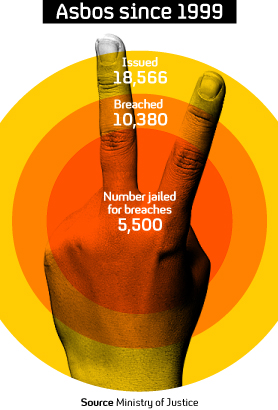Asbos to be abolished under new Government plans
As the Government announces new plans to tackle anti-social behaviour, a neighbourhood watch activist tells Channel 4 News a key aim must be to break the cycle of re-offending.

Plans to tackle anti-social behaviour in the UK have been announced with the introduction of two new behaviour orders.
The new measures will replace Anti-Social Behavioural Orders (Asbos). The new Criminal Behaviour Order can be attached to a criminal conviction whilst the Crime Prevention Injunction will target anti-social behaviour before it becomes a bigger problem.
In addition, there will be the introduction of “community triggers” where police will be compelled to follow up incidents reported by five or more members of the public.
Individuals given the new orders could face punishments that include the confiscation of personal items such as iPods or other electrical items. The reforms will also put pressure upon police to take low-level offences more seriously.

Criticism of Asbos since their introduction in 1999 centred around the fact that breaches of the order could only result in jail time, often seen as disproportionate to the crime rendering many Asbos meaningless or unenforceable. Under the new proposals the police will be given a number of remedies to combat anti-social behaviour ranging from the confiscation of property to offenders repairing the damage they caused or washing away grafitti.
Under Secretary of State for Crime Prevention, James Brokenshire, stated how the new measures will help police combat anti-social behaviour more quickly: “Instead of providing a specific tool to deal with every problem, we aim to introduce a handful of faster, more flexible and more effective tools that allow practitioners to protect victims and communities and get to the root of the problem.”
Instead of providing a specific tool to deal with every problem, we aim to introduce a handful of faster, more flexible and more effective tools Under Secretary of State for Crime Prevention, James Brokenshire
Home Secretary Theresa May believes that the reworking of the behavioural orders will give complainants more of a sense that justice is being done.
Speaking to The Daily Mail she said: “By calling it anti-social behaviour, it made it seem less important and less of a crime. Part of the problem is that people feel they are reporting things that are wrong but they are not seeing any action.“
The proposals have been welcomed by the Neighbourhood and Home Watch Network but chairperson, Jim Madden, told Channel 4 News that the changes alone will not be enough: “Tools are only as good as the officers and authorities who implement them. There needs to be consistent capacity and resources at a local level to implement the tools and to work in partnership with the community, to identify problems and to be involved in community based solutions.”
He also made it clear that the issue of persistent breaches and re-offending needed to be far better:”Resources should also be prioritised to support services not only for the victims of ASB (Anti-Social Behaviour) but also for the perpetrators who inevitably will continue to commit such acts if the cycle of offending is not broken.”
History of the Asbo
1999 Introduction of Anti-Social Behaviour Orders.
2002 Lack of clarity over Asbos leads to Police Reform Act.
2003 Anti Social Behaviour Act broadens remit further.
2004 - 2005 Asbos gain increased notoriety as the numbers issued more than doubles.
2005 The word 'Asbo' becomes so commonly used that it is added to the Collins English Dictionary.
2005 Alvaro Gil-Robles, the Council of Europe's human rights commissioner, accuses the UK of "asbomania"
2006 Research from the Youth Justice Board reveals over half of Asbos are breached and have become regarded as "a badge of honour".
2007 Children’s Secretary, Ed Balls, declares "I want to live in the kind of society that puts asbos behind us."
2008 Amount of Asbos issued drops by a third as Home Secretary Jacqui Smith calls for the use of other "early intervention measures".
2009 Rate of Asbo breaches rises to 67 percent.
2010 Just a month after the general election Home Secretary Theresa May signals the end to the Asbo.
2011 Coalition Government announces new proposals to combat anti-social behaviour that will see the end of the Asbo.
The opposition have pre-warned that any policy developments from the Coalition on the issue will be marred by the cuts in policing numbers. Labour predict that up to 10,000 police officer roles will be lost by the end of the year, a number disputed by Government ministers.
Shadow Home Office Minister Vernon Coaker believes that the strongest deterrent for anti-social behaviour has been police officer presence on the streets and working within local communities, not the use of Asbos or the proposed punishment orders.
“Whether using Asbos or the other measures the Labour government introduced, these teams have made a real difference. What we have learnt is that no matter what measures you introduce, you need the officers to enforce them.”
Topics
UK, Big Society, Coalition, David Cameron, Graphics, Home Office, Labour Party, Liberal Democrats-
Latest news
-
As India goes to the polls in the world’s largest election – what do British-Indians think?6m

-
Tees Valley: Meet the candidates in one of the biggest contests coming up in May’s local elections4m

-
Keir Starmer says public sector reform will be a struggle7m

-
Nicola Sturgeon’s husband Peter Murrell charged with embezzlement of funds from SNP1m

-
Ukraine might finally get $60billion in American weapons and assistance to defend against Russia3m

-




